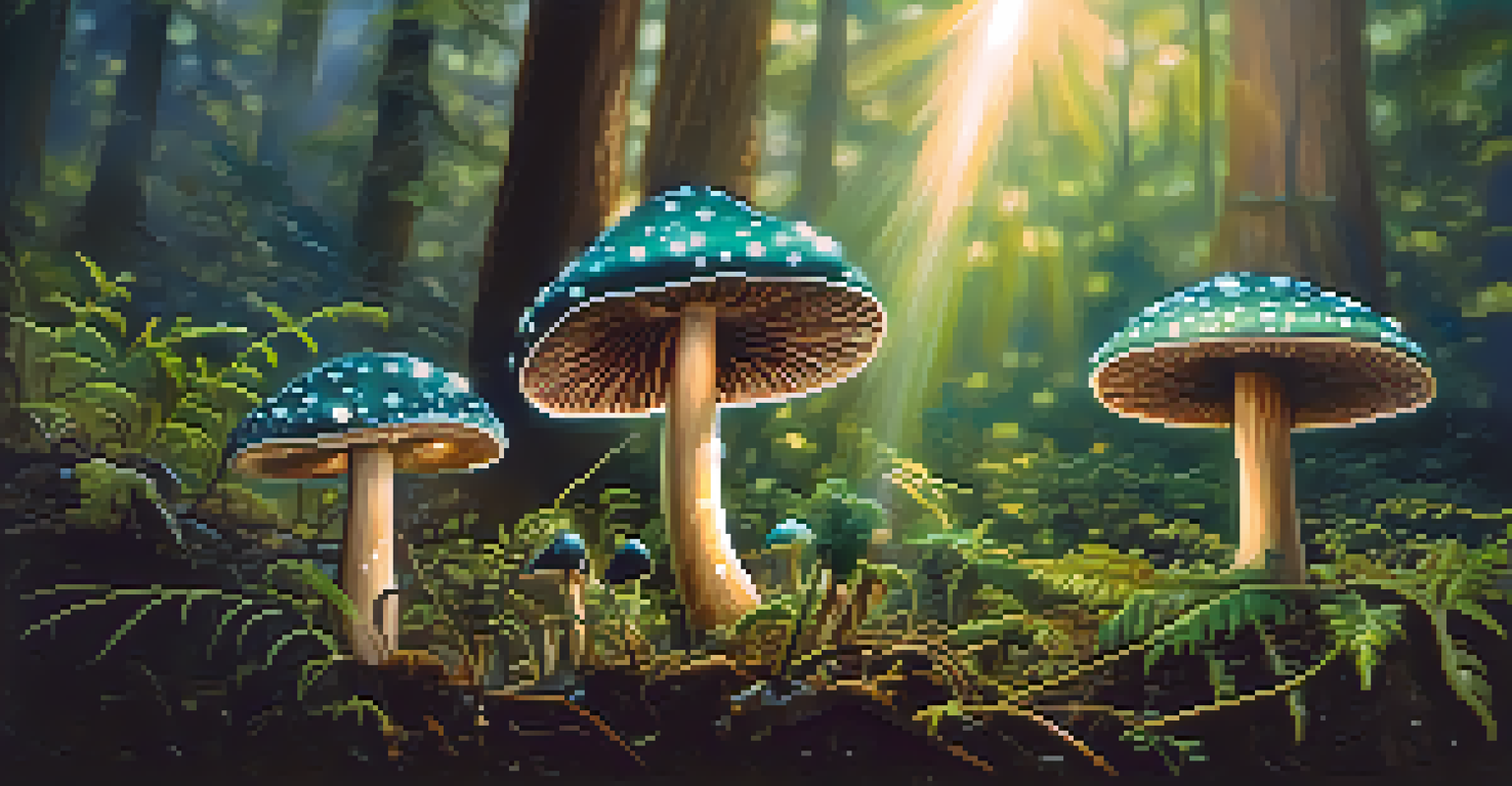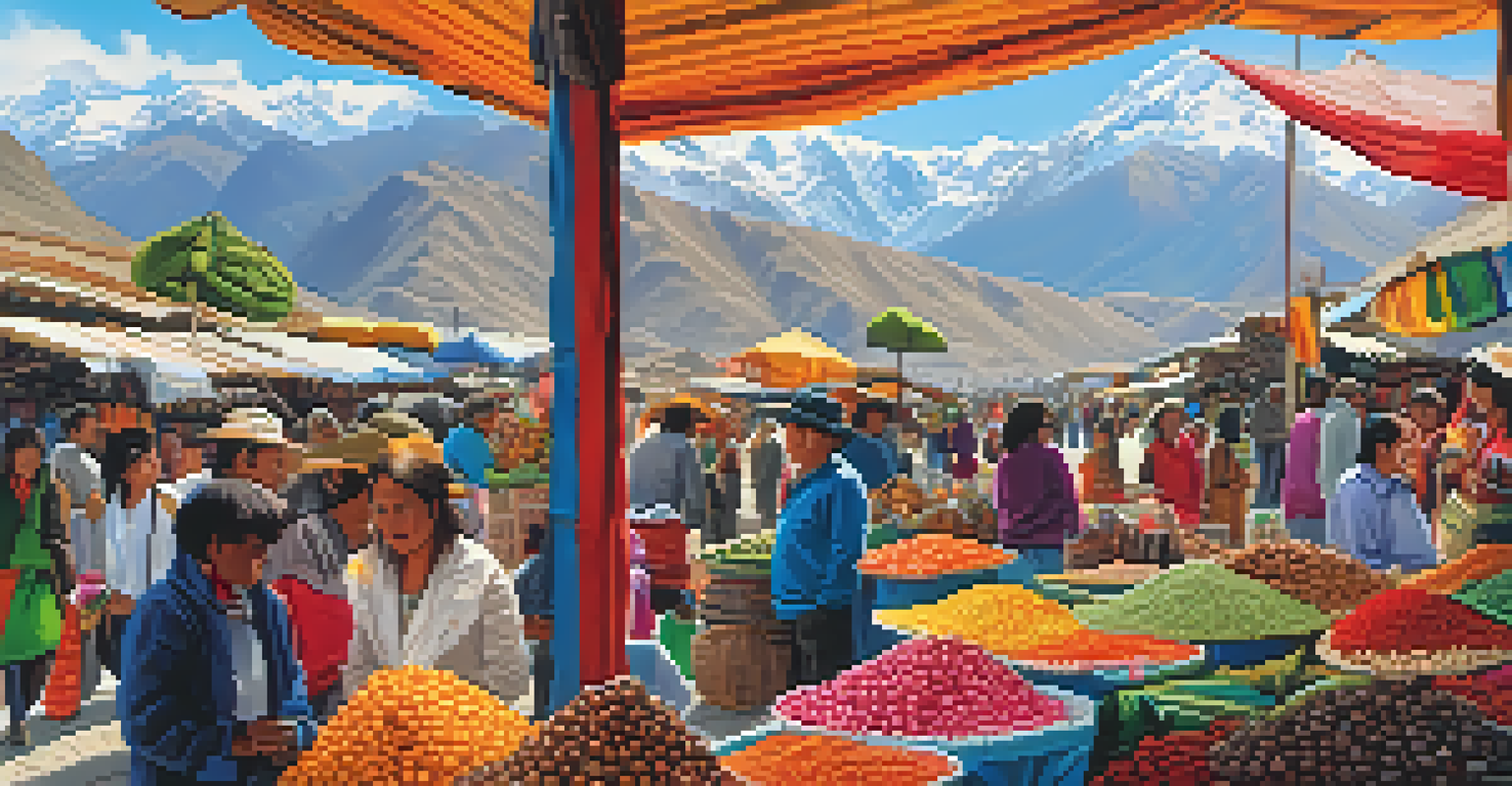Entheogens in Global Tourism: A Double-Edged Sword

Understanding Entheogens: Nature's Spiritual Tools
Entheogens are natural substances, often derived from plants, that induce altered states of consciousness. Traditionally used in spiritual ceremonies, these substances are gaining popularity in modern tourism as travelers seek authentic experiences. Examples include ayahuasca in the Amazon and psilocybin mushrooms in Mexico, both of which offer profound insights and healing for many seekers.
The use of entheogens in a spiritual context can be a profound experience, but it requires a deep respect for the cultural traditions from which they originate.
While these experiences can be enlightening, they also require careful consideration. Misuse or cultural appropriation can lead to disrespect towards the indigenous practices that have nurtured these traditions for centuries. Therefore, understanding the cultural context is crucial for anyone considering engaging with entheogens during their travels.
In the age of global connectivity, many are curious about entheogens, often resulting in increased tourism to regions where these substances are integral to local customs. This curiosity can lead to a deeper appreciation of different cultures, but it also raises questions about sustainability and ethical tourism.
The Rise of Psychedelic Tourism: A Growing Trend
Psychedelic tourism has surged in recent years, with travelers flocking to destinations known for their entheogenic experiences. This trend is often fueled by social media, where stunning visuals and personal testimonials showcase transformative journeys. As a result, countries such as Peru and Jamaica have become hotspots for those seeking spiritual awakening through guided ceremonies.

However, this rise comes with its own set of challenges. Increased demand can strain local resources and lead to commercialization, which may dilute the authentic experiences that these practices offer. Moreover, it poses a risk of exploitation, where travelers may inadvertently contribute to the degradation of local traditions.
Cultural Context is Crucial
Understanding the cultural significance of entheogens is vital for respectful engagement and to avoid cultural appropriation.
Balancing the benefits of this tourism boom with the need to respect local cultures is essential. Engaging with local guides and participating in ethical practices can help ensure that the benefits of psychedelic tourism extend to the communities hosting these experiences.
Cultural Appropriation vs. Cultural Appreciation
As entheogens attract more tourists, the line between cultural appropriation and appreciation becomes blurred. Many travelers are eager to learn about indigenous practices, but without proper understanding, they risk commodifying sacred rituals. This can lead to feelings of resentment among local communities who may feel their traditions are being misrepresented or exploited.
Cultural appropriation occurs when elements of a culture are adopted without understanding their significance, often leading to harm.
Cultural appropriation occurs when elements of a culture are adopted without understanding their significance, often leading to harm. In contrast, cultural appreciation involves respectful engagement and learning from the culture, acknowledging its roots and values. Travelers should strive to navigate this delicate balance to foster mutual respect.
It's vital for tourists to approach these experiences with humility and openness. Engaging in dialogue with local practitioners and respecting their boundaries can promote a more meaningful exchange, allowing both parties to benefit from the encounter.
Potential Risks: Safety and Legal Concerns
While entheogens can offer profound experiences, they also come with risks that travelers need to be aware of. The potency and effects of these substances can vary widely, leading to unpredictable reactions. Without proper guidance and context, individuals may find themselves in challenging or unsafe situations.
Additionally, legal issues surrounding the use of entheogens differ significantly from one country to another. In some places, they might be celebrated, while in others, they could lead to severe legal repercussions. It’s essential for tourists to educate themselves on local laws to avoid unintentional violations.
Safety and Legal Awareness Needed
Travelers must be aware of the varying legalities and potential risks associated with entheogens to ensure a safe experience.
By prioritizing safety and understanding the legal landscape, travelers can mitigate potential risks. Seeking reputable guides and participating in well-structured ceremonies can enhance both safety and the overall experience.
Environmental Impact: Sustainability Considerations
The influx of tourists seeking entheogenic experiences can have significant environmental implications. Popular destinations may face challenges such as deforestation and habitat destruction due to increased demand for resources. This can disrupt local ecosystems and threaten the very plants that are central to these traditional practices.
Sustainable tourism practices are essential to balance the economic benefits with the need to protect the environment. Encouraging eco-friendly practices, such as supporting local agriculture and promoting conservation efforts, can help preserve the natural habitats that sustain these important plants.
Tourists can play a crucial role in supporting sustainability by choosing eco-conscious tours and respecting local environments. This commitment not only aids in conservation but also enriches the travel experience, allowing visitors to connect more deeply with the natural world.
The Therapeutic Potential of Entheogens
Recent studies suggest that entheogens may have therapeutic benefits, particularly in mental health treatment. Substances like psilocybin and MDMA are being explored for their potential in treating conditions such as PTSD and depression. This growing interest has led to a resurgence in research and a re-evaluation of these substances in a clinical context.
As more evidence emerges, the conversation around entheogens is shifting from taboo to a more nuanced understanding of their benefits. This shift is encouraging some regions to integrate these practices into their healthcare systems, offering patients alternative treatments that may be more effective than traditional methods.
Sustainability is Essential
The rise of entheogenic tourism necessitates sustainable practices to protect local environments and cultures.
While this therapeutic potential is exciting, it must be approached with caution. Ensuring that these substances are used responsibly and within a therapeutic framework is vital to avoid misuse and to honor the cultural significance they hold.
Navigating the Future of Entheogenic Tourism
As interest in entheogens grows, the future of this tourism niche will depend heavily on responsible practices. Communities must find ways to manage the influx of visitors while preserving their cultural integrity and natural resources. This may involve developing guidelines that promote ethical engagement and sustainability.
Collaborative efforts between local communities, policymakers, and tourism operators are essential in creating a framework that benefits everyone. Education campaigns can help inform tourists about the importance of cultural respect and environmental stewardship, fostering a more responsible tourism culture.

Ultimately, the future of entheogenic tourism holds great potential for both visitors and host communities. By prioritizing ethical practices and mutual respect, we can ensure that this burgeoning sector contributes positively to cultural exchange and the preservation of traditional knowledge.